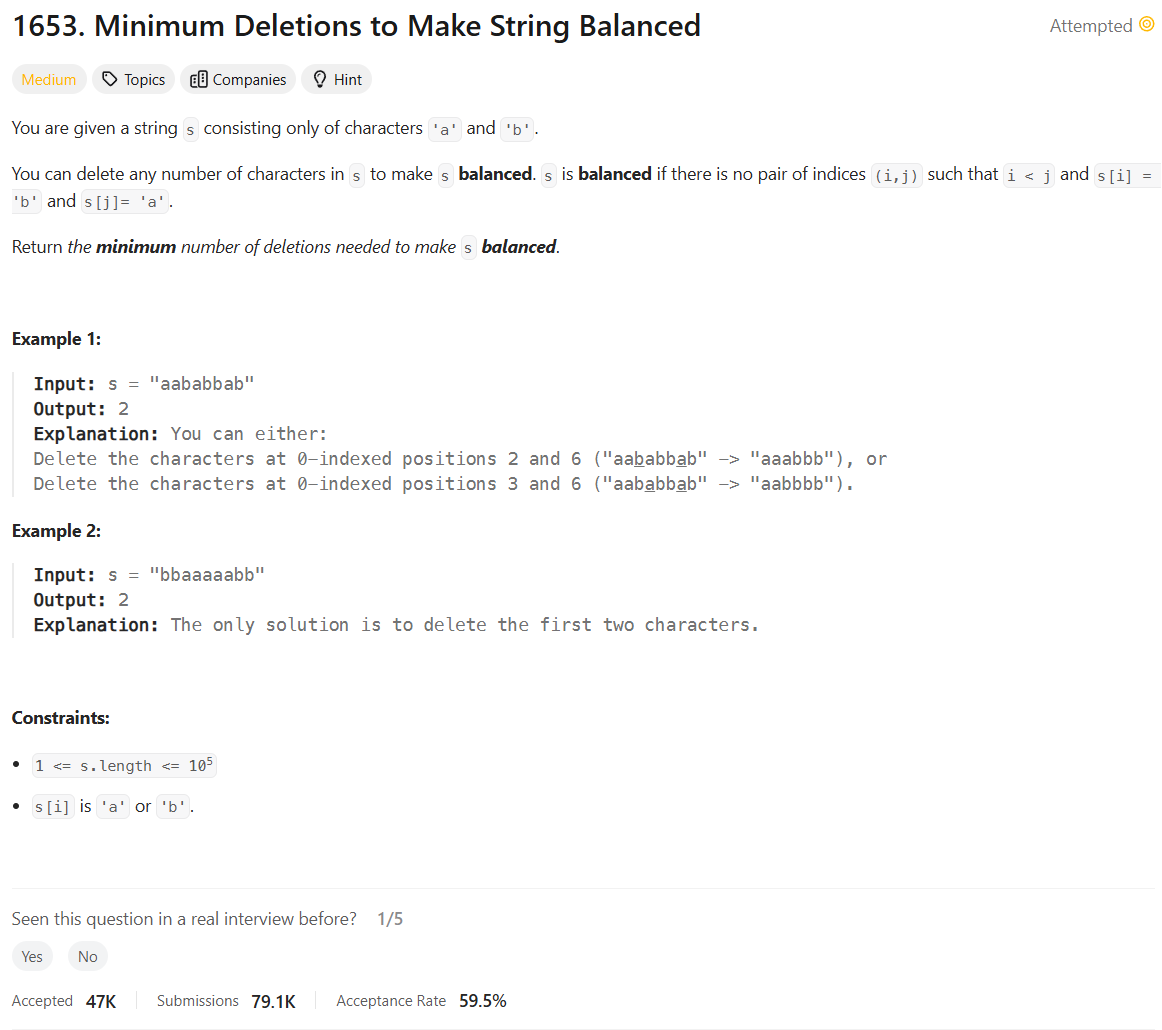Problem of The Day: Minimum Deletions to Make String Balanced
Problem Statement

Memoization Approach - TLE
class Solution:
def dfs(self, i, s, count, memo):
if i == len(s):
return count if count > 0 else float('inf')
if (i, s, count) in memo:
return memo[(i, s, count)]
remove_a = remove_b = skip = float('inf')
if i - 1 >= 0 and s[i - 1] == 'b' and s[i] == 'a':
remove_b = self.dfs(i - 1, s[:i - 1] + s[i:], count + 1, memo)
remove_a = self.dfs(i - 1, s[:i] + s[i + 1:], count + 1, memo)
else:
skip = self.dfs(i + 1, s, count, memo)
memo[(i, s, count)] = min(remove_a, remove_b, skip)
return memo[(i, s, count)]
def minimumDeletions(self, s: str) -> int:
if len(s) == 1:
return 0
if len(set(s)) == 1:
return 0
memo = defaultdict()
return self.dfs(1, s, 0, memo)
Editorial
Approach 1: Three-Pass Count Method
class Solution:
def minimumDeletions(self, s: str) -> int:
n = len(s)
count_a = [0] * n
count_b = [0] * n
b_count = 0
# First pass: compute count_b which stores the number of
# 'b' characters to the left of the current position.
for i in range(n):
count_b[i] = b_count
if s[i] == "b":
b_count += 1
a_count = 0
# Second pass: compute count_a which stores the number of
# 'a' characters to the right of the current position
for i in range(n - 1, -1, -1):
count_a[i] = a_count
if s[i] == "a":
a_count += 1
min_deletions = n
# Third pass: iterate through the string to find the minimum deletions
for i in range(n):
min_deletions = min(min_deletions, count_a[i] + count_b[i])
return min_deletions
Approach 2: Combined Pass Method
class Solution:
def minimumDeletions(self, s: str) -> int:
n = len(s)
count_a = [0] * n
a_count = 0
# First pass: compute count_a which stores the number of
# 'a' characters to the right of the current position
for i in range(n - 1, -1, -1):
count_a[i] = a_count
if s[i] == "a":
a_count += 1
min_deletions = n
b_count = 0
# Second pass: compute minimum deletions on the fly
for i in range(n):
min_deletions = min(count_a[i] + b_count, min_deletions)
if s[i] == "b":
b_count += 1
return min_deletions
Approach 3: Two-Variable Method
class Solution:
def minimumDeletions(self, s: str) -> int:
n = len(s)
a_count = sum(1 for ch in s if ch == "a")
b_count = 0
min_deletions = n
# Second pass: iterate through the string to compute minimum deletions
for ch in s:
if ch == "a":
a_count -= 1
min_deletions = min(min_deletions, a_count + b_count)
if ch == "b":
b_count += 1
return min_deletions
Approach 4: Using stack (one pass)
class Solution:
def minimumDeletions(self, s: str) -> int:
char_stack = []
delete_count = 0
# Iterate through each character in the string
for char in s:
# If stack is not empty, top of stack is 'b',
# and current char is 'a'
if char_stack and char_stack[-1] == "b" and char == "a":
char_stack.pop() # Remove 'b' from stack
delete_count += 1 # Increment deletion count
else:
char_stack.append(char) # Append current character to stack
return delete_count
Approach 5: Using DP (One Pass)
class Solution:
def minimumDeletions(self, s: str) -> int:
n = len(s)
dp = [0] * (n + 1)
b_count = 0
# dp[i]: The number of deletions required to
# balance the substring s[0, i)
for i in range(n):
if s[i] == "b":
dp[i + 1] = dp[i]
b_count += 1
else:
# Two cases: remove 'a' or keep 'a'
dp[i + 1] = min(dp[i] + 1, b_count)
return dp[n]